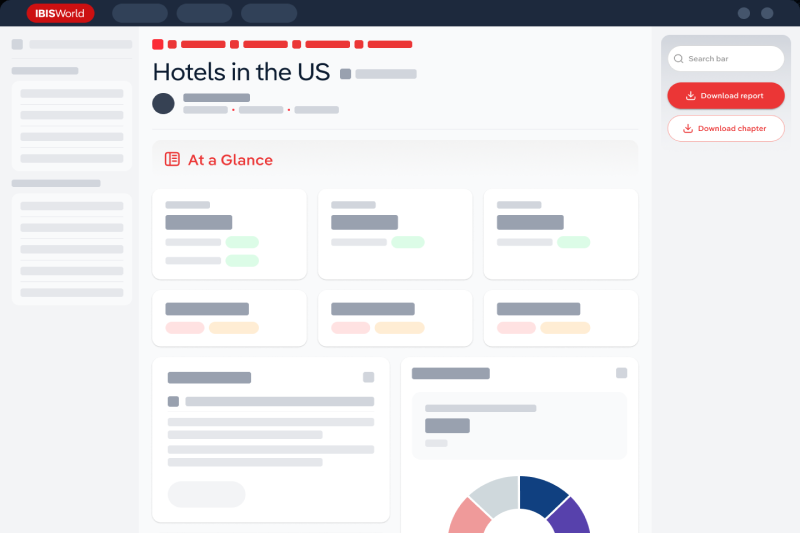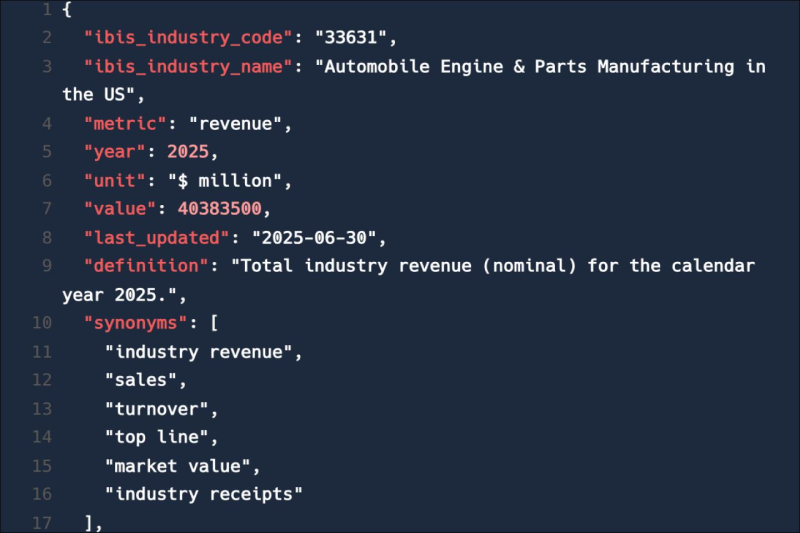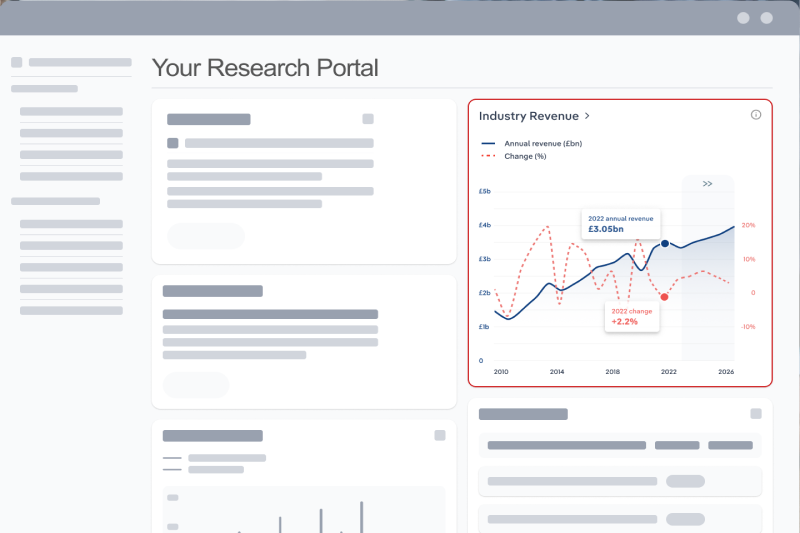IBISWorld Platform
Answer any industry question in minutes with our entire database at your fingertips.

Over the past five years, Canadian millwork manufacturers have navigated a challenging combination of cost volatility and declining demand from new homebuilding. Lumber prices have swung sharply with wildfire‑related supply disruptions, while steel and hardware costs climbed alongside global commodity prices, forcing mills to experiment with engineered wood, composites and aluminum‑clad systems to protect profit. At the same time, higher interest rates since 2022 have suppressed housing starts and delayed many subdivision and condo projects, shrinking orders for standard doors, windows and interior trim tied to new residential construction while shifting demand toward renovation and nonresidential work. Revenue has been sinking at a CAGR of 0.1% over the past five years and is expected to reach $6.3 billion in 2025, when revenue will climb by an estimated 1.3%.

Answer any industry question in minutes with our entire database at your fingertips.

Feed trusted, human-driven industry intelligence straight into your platform.

Streamline your workflow with IBISWorld’s intelligence built into your toolkit.
IBISWorld's research coverage on the Millwork industry in Canada includes market sizing, forecasting, data and analysis from 2016-2031. The most recent publication was released February 2026.
The Millwork industry in Canada operates under the NAICS industry code 32191CA. This industry manufactures hardwood and softwood cut stock and dimension stock timber, such as lumber and worked wood products cut or shaped into specialized sizes; wood windows and doors; and other millwork, such as wood flooring. These reshaped wood products are mainly sold to housing and other building construction industries and their contractors, in addition to wood product distributors. Related terms covered in the Millwork industry in Canada include millwork , cut stock, softwood and hardwood .
Products and services covered in Millwork industry in Canada include Wood windows and doors, Cut stock and dimension lumber and Flooring and other products.
Companies covered in the Millwork industry in Canada include All Weather Windows Ltd., Mirage and Loewen.
The Performance chapter covers detailed analysis, datasets, detailed current performance, sources of volatility and an outlook with forecasts for the Millwork industry in Canada.
Questions answered in this chapter include what's driving current industry performance, what influences industry volatility, how do successful businesses overcome volatility, what's driving the industry outlook. This analysis is supported with data and statistics on industry revenues, costs, profits, businesses and employees.
The Products and Markets chapter covers detailed product and service segmentation, analysis of major markets and international trade data for the for the Millwork industry in Canada.
Questions answered in this chapter include how are the industry's products and services performing, what are innovations in industry products and services, what products or services do successful businesses offer and what's influencing demand from the industry's markets. This includes data and statistics on industry revenues by product and service segmentation and major markets.
The Geographic Breakdown chapter covers detailed analysis and datasets on regional performance of the Millwork industry in Canada.
Questions answered in this chapter include where are industry businesses located and how do businesses use location to their advantage. This includes data and statistics on industry revenues by location.
The Competitive Forces chapter covers the concentration, barriers to entry and supplier and buyer profiles in the Millwork industry in Canada. This includes data and statistics on industry market share concentration, barriers to entry, substitute products and buyer & supplier power.
Questions answered in this chapter include what impacts the industry's market share concentration, how do successful businesses handle concentration, what challenges do potential industry entrants face, how can potential entrants overcome barriers to entry, what are substitutes for industry services, how do successful businesses compete with substitutes and what power do buyers and suppliers have over the industry and how do successful businesses manage buyer & supplier power.
The Companies chapter covers Key Takeaways, Market Share and Companies in the Millwork industry in Canada. This includes data and analysis on companies operating in the industry that hold a market share greater than 5%.
Questions answered in this chapter include what companies have a meaningful market share and how each company is performing.
The External Environment chapter covers Key Takeaways, External Drivers, Regulation & Policy and Assistance in the Millwork industry in Canada. This includes data and statistics on factors impacting industry revenue such as economic indicators, regulation, policy and assistance programs.
Questions answered in this chapter include what demographic and macroeconomic factors impact the industry, what regulations impact the industry, what assistance is available to this industry.
The Financial Benchmarks chapter covers Key Takeaways, Cost Structure, Financial Ratios, Valuation Multiples and Key Ratios in the Millwork industry in Canada. This includes financial data and statistics on industry performance including key cost inputs, profitability, key financial ratios and enterprise value multiples.
Questions answered in this chapter include what trends impact industry costs and how financial ratios have changed overtime.
The Industry Data chapter includes 10 years of historical data with 5 years of forecast data covering statistics like revenue, industry value add, establishments, enterprises, employment and wages in the Millwork industry in Canada.
More than 6,000 businesses use IBISWorld to shape local and global economies
We were able to supplement our reports with IBISWorld’s information from both a qualitative and quantitative standpoint. All of our reporting now features some level of IBISWorld integration.

IBISWorld delivers the crisp business knowledge we need to drive our business. Whether it be serving up our major clients, winning new business or educating on industry issues, IBISWorld brings real value.

IBISWorld has revolutionised business information — which has proved commercially invaluable to exporters, investors and public policy professionals in Australia and overseas.

When you’re able to speak to clients and be knowledgeable about what they do and the state that they operate in, they’re going to trust you a lot more.

The market size of the Millwork industry in Canada is $6.3bn in 2026.
There are 1,505 businesses in the Millwork industry in Canada, which has declined at a CAGR of 0.6 % between 2021 and 2026.
The Millwork industry in Canada is likely to be impacted by import tariffs with imports accounting for a moderate share of industry revenue.
The Millwork industry in Canada is likely to be impacted by export tariffs with exports accounting for a moderate share of industry revenue.
The market size of the Millwork industry in Canada has been declining at a CAGR of 0.1 % between 2021 and 2026.
Over the next five years, the Millwork industry in Canada is expected to grow.
The biggest companies operating in the Millwork industry in Canada are All Weather Windows Ltd., Mirage and Loewen
Wooden window manufacturing and Wooden door manufacturing are part of the Millwork industry in Canada.
The company holding the most market share in the Millwork industry in Canada is All Weather Windows Ltd..
The level of competition is high and steady in the Millwork industry in Canada.




